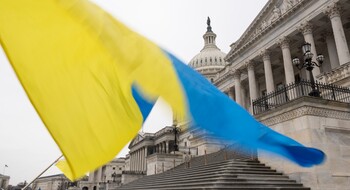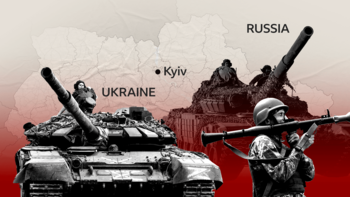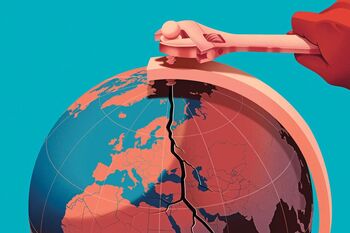Osman Softić || 25 March 2025
 From Trump’s perspective, a continuation of America’s support for Ukraine in its war effort is not only a waste of money and equipment but it also causes disproportionate damage that Washington suffers compared to Europe. Trump claims that Washington poured $350 billion into Ukraine while Europe has only committed $50 billion. The billions of dollars in military and logistical aid have failed to produce any significant results on the battlefield. Russia’s military capabilities did not diminish under the weight of sanctions and the claims of expected economic collapse of Russia were misguided. Trump wants to end the conflict because he does not even believe that Russia started it in the first place as it began in 2014. The US president also opposes the plans of neoconservatives and liberal interventionists in Washington who are bent on maintaining American hegemony over Europe.
From Trump’s perspective, a continuation of America’s support for Ukraine in its war effort is not only a waste of money and equipment but it also causes disproportionate damage that Washington suffers compared to Europe. Trump claims that Washington poured $350 billion into Ukraine while Europe has only committed $50 billion. The billions of dollars in military and logistical aid have failed to produce any significant results on the battlefield. Russia’s military capabilities did not diminish under the weight of sanctions and the claims of expected economic collapse of Russia were misguided. Trump wants to end the conflict because he does not even believe that Russia started it in the first place as it began in 2014. The US president also opposes the plans of neoconservatives and liberal interventionists in Washington who are bent on maintaining American hegemony over Europe.
Trump believes that American liberals and Europeans have been using the war in Ukraine for their own profiteering but also to weaken Russia. They wanted Russia to have its share of Vietnam or Afghanistan. In addition, Zelenskyy complained that his country never received the aid that US policymakers claimed was transferred to Ukraine. He said that much of the money went to US corporations that produced weapons used in Ukraine.
Making America Great Again!
Trump holds his predecessor Biden responsible for the war, accusing him of having provoked Russian invasion when he promised that Ukraine would join NATO. Incidentally, Trump claims that his moves to end a failed policy does not mean that he is a pacifist president. Trump simply has other priorities. He perceives China as America’s major strategic peer competitor on the global stage. In that he is no different from his predecessor Biden. Trump also wants to take control of the Panama Canal which is controlled by China, an unacceptable intrusion in American backyard, at least from the point of view of the principles set by Monroe Doctrine in 1823. The Trump administration views the world through the prism of realism.
Claims that he wants to take control of precious and rare earth minerals in eastern Ukraine and in Greenland and Canada in order to increase the production of the latest technologies and microchips for artificial intelligence and electric vehicles, are grossly oversimplified. Trump did indeed use these threats and paradigms in the manner of a salesman in specific dollar terms, but only to create conducive environment for negotiations and to ensure more favorable strategic outcomes for the United States as it is repositioning itself on the global stage and fortifying its position in the western hemisphere.
His particular reference to Panama, Canada and Greenland has much more to do with America’s strategic consideration rather than monetary value. Trump cloaked it in dollar terms to appeal to his core domestic base which value policy only in as much as it is directed toward economic improvement of their wellbeing, and whether it is in the service of “make America great again”, that is whether it can generate domestic jobs and manufacturing. His core support base is simple and puts economics above all else. Trump’s advisors on strategy are a different bunch altogether. They understand the shifts in global power and they act accordingly.
Many observers fail to appreciate the gravity of the situation and the increasingly intense competition in the Arctic for exploiting its resources and strategic maneuvering given the fast melting of ice due to climate change which will make the Arctic waters navigable sooner than many expected. Greenland and Canada therefore may well become equivalent to what Ukraine is to Russia in the game of global strategic competition between the US and China or with Russia for that matter. Hence, having normalized relations with Russia makes perfect sense from Trump’s realist international relations perspective. Hence his pressure on both Greenland (Denmark) and Canada as well as Mexico was to prime those countries, all America’s neighbors, for negotiating a better deal. According to New York-based Intelligencer magazine, Trump’s argument with Canada is not only about trade tariffs, rather it is about much bigger and more significant strategic issues such as border changes, among other things.
Global Supremacy
The Trump administration has also offered to sell F-35 fighter jets to India. The United States has long had a strategy to strengthen India militarily as a counterweight to China. This fits perfectly within the doctrine of “pivoting to Asia” – transferring resources from Europe to the Indo-Pacific. Trump therefore insists that Europe should increase its defense spending from 2.5 percent of GDP to 5 percent. He also threatened to withdraw the United States from NATO if they did not. In response, European leaders including new conservative German Chancellor Friedrich Merz have taken the initiative and promised to launch a new European security system in opposition to Trump’s threats to withdraw forces from Europe.
 In the meantime, Trump will almost certainly intensify the US-China security competition for global supremacy. In this long-term security and economic competition between Washington and Beijing, Washington hopes for Russia to remain neutral as a way of gratitude for Washington’s efforts to pressure Ukraine and Europe to end the armed conflict in Ukraine on Russia’s favorable terms to the dismay of Brussels and Kiev and the US liberal Washington establishment for that matter. Trump will guarantee to Putin that Ukraine will not become a member of NATO thereby removing a perceived security threat from NATO to Russia’s homeland. However, no one can predict with a degree of certainty whether Moscow will sacrifice its “unlimited friendship with China” for the sake of American strategic interests. However, since this scenario offers Russia an opportunity to position itself as a serious great power player – recognition long sought by Moscow to regain its former prestige and an American recognition as a great power, the true successor to the USSR Putin has been seeking for more than a decade. This would offer Russia a status to act in the long term as a balancing force between USA and China in a new bipolar or multipolar world after the end of US liberal hegemonic order. India, another rising great power jealously guards its strategic autonomy, has in recent years become a close strategic partner to America, could along with Moscow play a similar balancing role to check the power of China.
In the meantime, Trump will almost certainly intensify the US-China security competition for global supremacy. In this long-term security and economic competition between Washington and Beijing, Washington hopes for Russia to remain neutral as a way of gratitude for Washington’s efforts to pressure Ukraine and Europe to end the armed conflict in Ukraine on Russia’s favorable terms to the dismay of Brussels and Kiev and the US liberal Washington establishment for that matter. Trump will guarantee to Putin that Ukraine will not become a member of NATO thereby removing a perceived security threat from NATO to Russia’s homeland. However, no one can predict with a degree of certainty whether Moscow will sacrifice its “unlimited friendship with China” for the sake of American strategic interests. However, since this scenario offers Russia an opportunity to position itself as a serious great power player – recognition long sought by Moscow to regain its former prestige and an American recognition as a great power, the true successor to the USSR Putin has been seeking for more than a decade. This would offer Russia a status to act in the long term as a balancing force between USA and China in a new bipolar or multipolar world after the end of US liberal hegemonic order. India, another rising great power jealously guards its strategic autonomy, has in recent years become a close strategic partner to America, could along with Moscow play a similar balancing role to check the power of China.
US-Russia détente
It is useful to recall what George Friedman, one of the most astute American geopolitical analysts, recently commented about prospective US-Russia détente. Friedman, even though he said he did not vote for Trump, explained why the American president is taking a conciliatory approach to Russia and why Washington suddenly wants to have peace in Ukraine and normalization of relations with Moscow. Friedman rejects criticism of Trump that the American president is stupid or foolish and that he acts irrationally. On the contrary, “Trump is a very smart and capable leader and has an excellent understanding and grasp of international relations”, especially the moment the world is in. “Having been elected as the head of the American republic twice and controlling both houses of the American Congress, can only be done by exceptionally intelligent and smart political leader”, Friedman asserts. Therefore, he wonders how it is possible for the British or Europeans to be astounded when they ask: “what on earth happened to our American friends. Why do they look at the world differently from us”?
Friedman actually believes that the US does not see the world differently at all. The world has changed, and the US is just noticing it. Power has shifted in the world and the United States is seeking a different role for itself in that new world. “It is not Donald Trump who has disrupted the world. He came to the presidency at a time when power has shifted and the balance of power has changed”. For Friedman, Ukraine is not that important to American interests in global terms. He sees the Ukrainian war as a dance podium, a ballet of sorts, that has taken place after which “a new act” will follow. According to Friedman, the Europeans want to be militarily in Ukraine but refuse to take casualties. Friedman has mounted harsh and sustained but well-founded criticisms of Europe when he said that “Western political elites were infinitely committed to the “post-war order“, to NATO and to the European Union. They are used to these concepts of how the world can and must function. This is why the European liberal elites are now somewhat confused.
Trump’s new approach to international relations seems repulsive to them. The European liberal elites cannot accept the fact that those countries that were important a decade ago are no longer relevant today regardless of ideology of liberalism to which they subscribe and claim to be committed to. Russia was a real threat to Europe during the Soviet Union period, but Russia is not a threat to the west today. Russia ceased to be a threat to Europe after the end of the Cold War. From the vantage point of Trump’s strategic policy strategists, Russia has lost the war in Ukraine. As much as it may sound paradoxical, Russia lost the war because it had failed to conquer more than 20 percent of Ukrainian territory, it was forced into a stalemate. Russian forces were unable to occupy and take over Ukraine, let alone overrun Europe.
 Of course, this does not mean that Ukraine won the war. Ukraine is a wrecked country and its military has been decimated. Its infrastructure is in ruins. But Russia could not occupy Ukraine except a few oblasts (eastern districts). Russia could not take Kiev; it could not execute regime change operations in Ukraine and install its puppet regime. The United States is aware of this. On the other hand, liberal Europe is not interpreting the conflict in Ukraine in the same way Americans do. Great Britain, where Russophobia is at its highest level still manages to scare its citizens that “Russia will overrun Europe” despite the fact that Russia was powerless to occupy the whole of Ukraine. Scaremongering that Putin is a new Hitler may resonate with liberal European class but it is plain nonsense.
Of course, this does not mean that Ukraine won the war. Ukraine is a wrecked country and its military has been decimated. Its infrastructure is in ruins. But Russia could not occupy Ukraine except a few oblasts (eastern districts). Russia could not take Kiev; it could not execute regime change operations in Ukraine and install its puppet regime. The United States is aware of this. On the other hand, liberal Europe is not interpreting the conflict in Ukraine in the same way Americans do. Great Britain, where Russophobia is at its highest level still manages to scare its citizens that “Russia will overrun Europe” despite the fact that Russia was powerless to occupy the whole of Ukraine. Scaremongering that Putin is a new Hitler may resonate with liberal European class but it is plain nonsense.
Cold War Mentality
After three years of bloody war in Ukraine, Americans realized that Russia no longer posed a serious military threat to Europe nor to the West at large. Therefore, Washington under Trump’s stewardship wants to talk to Putin. Donald Trump wants to reach a peace agreement with Russia and to normalize its relations with Russia. Unfortunately. Europe was unable to see this reality. Europe still looks at Russia through the lenses of the “Cold War Mentality”. NATO was created after World War II for one reason, and for one reason alone, because the communist Soviet Union represented not only ideological but a real military threat to Europe and to the West. This world has long gone. Now that Russia has demonstrated in Ukraine, that for the past three years it no longer is a military threat.
Therefore, according to Trump, NATO becomes largely irrelevant, at least on the basis of the rationale upon which it was founded in the first place. Friedman asserts that the idea that Russia is some kind of permanent, fixed and unchanging figure (a mortal threat) has become anachronistic and simply does not hold water anymore. It is precisely for this reason that the American perception of the world has changed. American perception of Russia as a military threat has changed.
On the other hand, the European perception of the world has not changed. Europeans have not yet understood that the former Russian threat and the Cold War are over. According to Friedman, the Cold War is over and it is over in Ukraine! This is the difference in the perception of the threat between America and Europe, at least from the point of view of the Trump American administration. American strategists who are now realists – this cannot be said for neoconservatives and liberal internationalists whose raison d’être has always been to invent non-existent threats and to pursue enemies to be destroyed, are convinced that in Ukraine, Russia had demonstrated the limits of its military power. However, the mindset and concepts that were shaped on the basis of the “cold war-consciousness” still dominate the minds of European liberal political and cultural elites.
These concepts are outdated today but they will last for some time until this way of reasoning changes. Trump, Friedman believes, has understood reality reasonably accurately. Therefore, he wants to establish a new and stable world order in which Russia and the United States will no longer be enemies or rivals but partners. Therefore, all the stories, accusations or jokes about Trump being a “Russian agent” or “Putin’s poodle”, which are spread by ignorant mischief and fear mongers who care less about the killing in Ukraine, are actually hostages of the outdated geopolitical thinking rather than genuine peace makers.
Understanding Geopolitics & Conclusion
Kishore Mahbubani, a leading Singaporean geopolitical expert, international relations scholar and diplomat, who was former president of the UN Security Council, has recently commented on the ruthlessness of geopolitics as a phenomenon. Mahbubani fiercely criticized the leadership of the European Union for their naive and frivolous behavior. He had some harsh words in particular for the incomprehensible and excessive servility European leaders unconditionally showed towards the American government, while neglecting their own interests.
 Mahbubani described the leaders of the European institutions as “geopolitically incompetent” because they did not foresee in time that America, when the going gets tough, will always look to protect its own interests rather than the interests of Europe, regardless of the level of loyalty that Europeans accord to their political overlords in Washington. Mahbubani believes that the Europeans who live next to Russia and will likely live next to Russia for the next thousand years, should have been more geopolitically astute and should not have relied exclusively on the US for their security. Instead of rejecting Moscow’s arguments that Russia too has its own security concerns that needed to be accommodated which Europe should have respected.
Mahbubani described the leaders of the European institutions as “geopolitically incompetent” because they did not foresee in time that America, when the going gets tough, will always look to protect its own interests rather than the interests of Europe, regardless of the level of loyalty that Europeans accord to their political overlords in Washington. Mahbubani believes that the Europeans who live next to Russia and will likely live next to Russia for the next thousand years, should have been more geopolitically astute and should not have relied exclusively on the US for their security. Instead of rejecting Moscow’s arguments that Russia too has its own security concerns that needed to be accommodated which Europe should have respected.
Mahbubani even suggested a few little pieces of advice that Europe could perhaps adopt to prove that it is a serious geopolitical player. The EU countries, Singaporean diplomatic don advised, should have signaled to the Americans that they were prepared to leave NATO, even if they do not need to act on the threat. He also recommended that the EU leaders should initiate serious dialogue with Russia on their own in relation to a new security architecture in Europe. They should also start considering a serious strategic cooperation with China. By doing so, Mahbubani believes, the Europeans would demonstrate that the EU is capable and ready to be strategically independent from Washington.
Mahbubani truly opened the eyes of many to better understanding why modern Europe, which was once the epicenter of global geostrategic thinking and which produced some of the world’s greatest political strategists and statesmen, today is incapable or willing to understand Washington’s imperative and the strategic need to establish peace in Ukraine and embark on good relations with Moscow.
This can only lead us to the conclusion that Europe is indeed an economic and technological powerhouse and at the same time it is a strategic vassal as well as a geopolitical dwarf in comparison to the United States and other great powers.
 Osman Softić is a Research Fellow at the Islamic Renaissance Front. He holds a BA degree in Islamic Studies from the Faculty of Islamic Studies of the University of Sarajevo and has a Master degree in International Relations from the University of New South Wales (UNSW). He contributed commentaries on Middle Eastern and Islamic Affairs for the web portal Al Jazeera Balkans, Online Opinion, Engage and Open Democracy. Osman holds dual Bosnian and Australian citizenship.
Osman Softić is a Research Fellow at the Islamic Renaissance Front. He holds a BA degree in Islamic Studies from the Faculty of Islamic Studies of the University of Sarajevo and has a Master degree in International Relations from the University of New South Wales (UNSW). He contributed commentaries on Middle Eastern and Islamic Affairs for the web portal Al Jazeera Balkans, Online Opinion, Engage and Open Democracy. Osman holds dual Bosnian and Australian citizenship.

